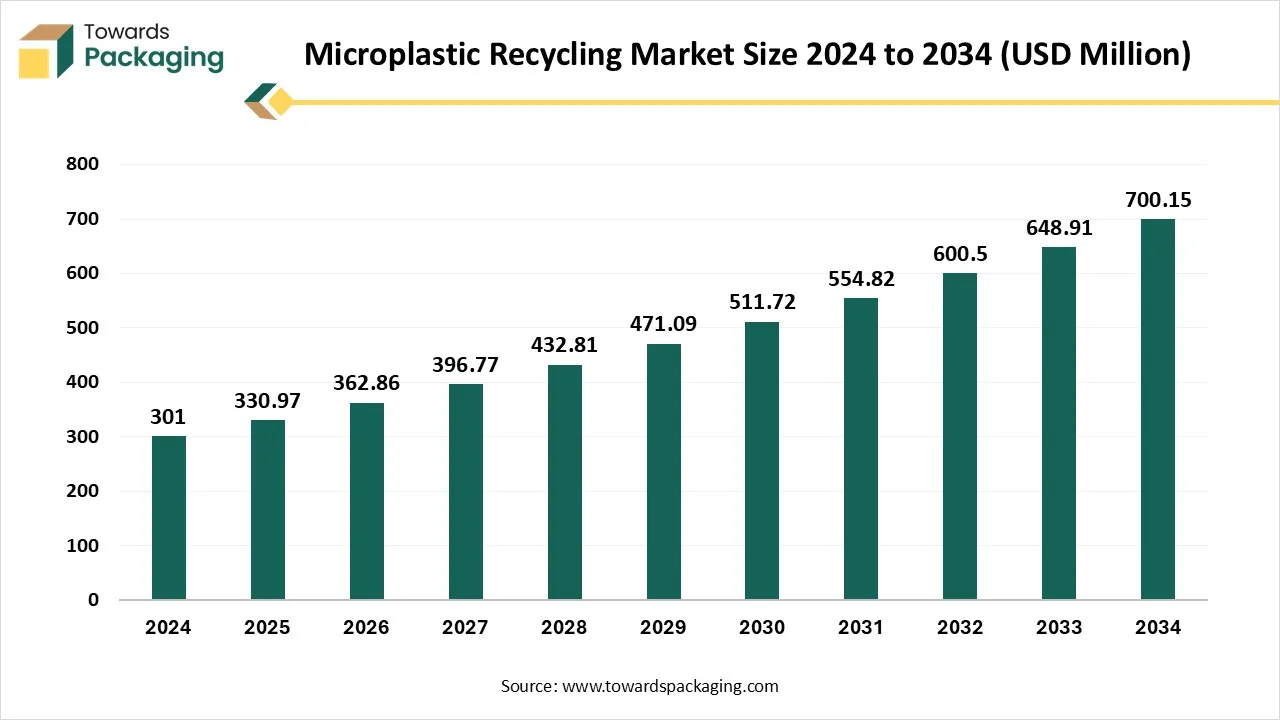The global microplastic recycling market is experiencing significant growth as industries and governments worldwide focus on mitigating plastic pollution. Valued at USD 330.97 million in 2025, the market is projected to reach USD 700.15 million by 2034, growing at a CAGR of 9.63%. Europe leads this movement, while Asia Pacific and North America are emerging as key regions for future expansion.

What Is Microplastic Recycling?
Microplastic recycling refers to the process of recovering and reprocessing plastic particles smaller than 5 millimeters. These particles originate from the breakdown of larger plastics or are intentionally manufactured, such as microbeads in cosmetics. Unlike traditional plastic recycling, microplastic recycling involves capturing these tiny particles from water, air, soil, and industrial waste. Advanced filtration and separation technologies are then used to treat them mechanically, chemically, or thermally, supporting a circular economy and safeguarding ecosystems.
Invest in Our Premium Strategic Solution: https://www.towardspackaging.com/download-sample/5651
Key Market Trends Driving Growth
Advanced Filtration and Sorting Technologies
Cutting-edge innovations like near-infrared and infrared spectroscopy allow precise identification and separation of microplastics as small as 10 µm. These advancements improve both the purity and recovery rates of recycled materials.
Chemical and Biological Recycling Innovations
Emerging methods such as pyrolysis, depolymerization, and enzyme-based biodegradation are gaining traction for handling mixed or contaminated microplastic streams.
Rising Regulatory Pressure and Public Awareness
Stricter regulations worldwide and growing consumer concern about microplastic pollution are driving investments in recycling infrastructure and R&D.
Collaborative R&D Efforts
Partnerships between governments, academic institutions, and private companies are fueling technology development, including AI-powered detection systems and novel materials for capturing microplastics.
Get All the Details in Our Solutions – Access Report Preview: https://www.towardspackaging.com/download-sample/5651
Market Dynamics: Drivers and Restraints
Drivers: Technological Advancements
Innovations like AI-driven sorting, nano-filtration, membrane separation, and electrochemical treatments are enabling more efficient microplastic capture and recovery. These technologies are essential for processing wastewater, ocean debris, and industrial discharges.
Restraints: Lack of Standardization
Despite progress, the industry faces challenges due to the absence of standardized recycling methods, especially for complex and contaminated microplastic mixtures. Limited end-use applications and quality concerns also restrict large-scale adoption.
Segmental Insights: Who’s Leading?
Secondary Microplastics Dominate
The secondary segment leads the market because these microplastics, formed from the breakdown of larger plastics, are the most widespread in oceans, rivers, and soils. Current recycling technologies are particularly effective in handling them.
Primary Products See Fastest Growth
There’s a rising demand for high-quality recycled microplastics in industries like packaging, textiles, automotive, and construction. These sectors are increasingly adopting recycled materials to meet sustainability targets and regulatory requirements.
Automotive Sector Gaining Momentum
Recycled microplastics are being used in lightweight vehicle components, helping automakers like Ford, GM, and Tesla achieve their sustainability goals. This trend is supported by advanced purification technologies that ensure high-quality recyclates.
If you have any questions, please feel free to contact us at sales@towardspackaging.com
Regional Insights: Europe Leads, Asia Pacific Accelerates
Europe’s Leadership
Europe dominates the market thanks to strong policies like the EU’s Circular Economy Action Plan and advanced recycling infrastructure. Countries like Germany and the UK are at the forefront, with Germany excelling in waste sorting and high recycling rates, and the UK showing promise through innovative projects.
Asia Pacific’s Rapid Growth
Asia Pacific is the fastest-growing region due to high plastic waste generation and proactive government policies in countries such as China, India, Japan, and South Korea. China leads with its focus on circular economy principles and advanced recycling technologies.
North America’s Notable Growth
The region is seeing a rise in demand for recycled microplastics in primary products and automotive applications, supported by sustainability initiatives and technological innovations.
Recent Developments and Innovations
-
Murdoch University, Australia: Pioneering bioplastics development to cut plastic waste by 80% by 2030.
-
Cleaner Seas Group, UK: Launching a recycling plant in Cornwall to save 86 tonnes of microplastics from oceans annually.
-
LG Energy Solution and Toyota Tsusho, U.S.: Joint venture for battery recycling supporting sustainable transportation.
-
HUGO BOSS: Introducing NovaPoly, a recycled polyester yarn addressing microplastic issues in fashion.
FAQs
Q. What are microplastics and why do they need recycling?
Microplastics are plastic particles smaller than 5mm found in oceans, rivers, soils, and even the air. Recycling them helps reduce their harmful impact on ecosystems and supports a circular economy.
Q. Why is Europe leading the microplastic recycling market?
Europe’s leadership stems from stringent environmental regulations, advanced recycling infrastructure, and high public awareness about plastic pollution. Countries like Germany and the UK are making major strides in microplastic recycling initiatives.
Q. Which industries use recycled microplastics?
Industries like packaging, textiles, automotive, and construction are adopting recycled microplastics to meet sustainability goals and reduce dependency on virgin plastics.
Q. What are the major challenges in microplastic recycling?
The industry faces challenges due to the lack of standardized recycling methods, limited scalable applications, and quality concerns that restrict the use of recycled microplastics in high-performance or food-grade products.
Q. How is Asia Pacific contributing to market growth?
Asia Pacific is seeing rapid growth thanks to high plastic waste generation, government initiatives banning single-use plastics, and technological advancements in sorting and recycling processes.
Source : https://www.towardspackaging.com/insights/microplastic-recycling-market-sizing






